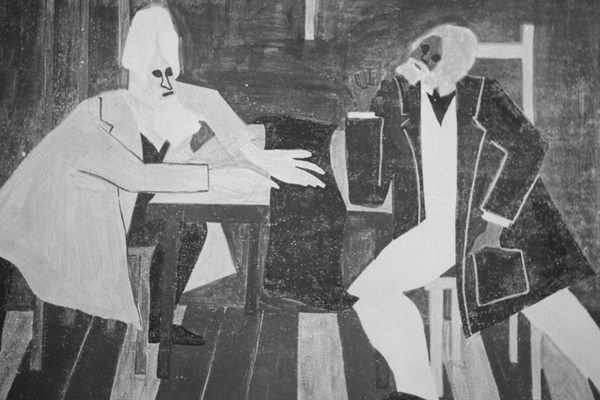The 1776 Presidential Commissioners Forgot That Dissent is as American as Hero Worship

NARA record: 1981548 - U.S. National Archives and Records Administration
On January 18th, Martin Luther King Day, the White House released the report of President Trump’s Advisory 1776 Commission. The White House described the report as “a definitive chronicle of the American founding . . .”
The 40-page report concludes that U.S. history, properly understood and taught, will show how America became “the most just and glorious country in all of human history.” The founding fathers were heroic figures, animated by principles “both true and eternal”; progressivism was a challenge to those principles comparable to slavery and fascism; and identity politics is the primary source of contemporary discord.
Historians assigned the report a failing grade, calling it “a hack job,” “riddled in errors, distortions, and outright lies,” and “bereft of any professional historical sensibility.”
But the report is not just bad history; it is bad pedagogy, a point that has received very little attention.
Maintaining that education should “convey an enlightened sense of patriotism,” the report claims that instead colleges and universities “are often today hotbeds of an anti-Americanism, libel, and censorship that combine to generate in students and in the broader culture at the very least disdain and at worst outright hatred for this country.” Teachers “peddle resentment and contempt” by telling America’s story “solely as one of oppression and victimhood” and advancing “claims of systemic racism that can only be eliminated by more discrimination.”
“Deliberately destructive scholarship,” the report claims, “is the intellectual force behind so much of the violence in our cities, suppression of free speech in our universities, and defamation of our treasured national statues and symbols.” Even though teachers “do not call it indoctrination. . . that is what it is.”
Two days after the report was issued, newly inaugurated President Joe Biden revoked the executive order establishing the commission. The report has disappeared from the White House website, but unfortunately its inaccurate and incendiary assumptions about American history and higher education remain widespread.
According to a 2018 survey by the Pew Research Center, nearly two-thirds of Americans are dissatisfied with U.S. universities. Among them, 79 percent of Republicans cited professors pushing political agendas in the classroom as a major reason.
Dating back at least to 1951, when William F. Buckley published God and Man at Yale: The Superstitions of ‘Academic Freedom,’ critiques of higher education as left-wing propaganda escalated during the Trump Administration. In a 2017 speech, Secretary of Education Betsy DeVos declared that liberal professors tell students “what to do, what to say and, more ominously, what to think.” In a July 4th speech at Mount Rushmore last year, President Trump concluded that “[a]gainst every law of society and nature, our children are taught in school to hate their own country.” One week later, Trump ordered the Treasury to reexamine the tax exempt status of colleges because “too many . . . are about Radical Left Indoctrination, not Education.”
In a Constitution Day speech last September, President Trump announced a National Endowment for the Humanities grant “to support the development of a pro-American curriculum that celebrates the truth about our nation’s great history,” and declared that he was forming the 1776 Commission “to promote patriotic education.”
Claims of left-wing indoctrination in schools resemble attacks on the 2020 presidential election results: lots of allegations, not much evidence. As we have argued elsewhere, even though faculty at most colleges and universities tend to lean left, multiple studies show that student views on subjects ranging from climate change to immigration vary little or not at all from matriculation to graduation, and only a small percentage of students say they feel pressure to conform to faculty views.
Ironically, the authors of the 1776 Report advocate what they insist educators should not do: ignore social complexity and indoctrinate students with a particular view of American history and government. After insisting that educators avoid “political agendas,” they simply assume that their simplistic hero-worship version of history is “accurate, honest, unifying, inspiring, and ennobling.”
The report provides only one explicit recommendation for a “genuine civics education,” that “[c]ivics and government classes should rely almost exclusively on primary sources,” and “without selective editing.” Consisting predominantly of documents written by Founding Fathers and U.S. Presidents, they do recommend, probably as a token to fend off criticism, Frederick Douglass’s speech on “The Meaning of the Fourth of July to the Negro” as one of the “key works” to be studied, citing the address as evidence that Douglass, a former slave, abolitionist, and statesman, considered the Constitution “a glorious liberty document.” Douglass does acknowledge that the Constitution, properly interpreted, is antithetical to slavery, but the heart of the speech (not mentioned in the report) is a condemnation of America’s failure to live up to its principles:
[Y]our [July 4th] celebration is a sham; your boasted liberty, an unholy license; your national greatness, swelling vanity; . . . your shouts of liberty and equality, hollow mockery; . . . a thin veil to cover up crimes which would disgrace a nation of savages. There is not a nation on the earth guilty of practices, more shocking and bloody, than are the people of these United States, at this very hour.
The most troubling aspect of the 1776 Report is its notion that there is a single, uncontestable, “accurate” version of history, fixed for all time. The study of history, of course, demonstrates just the opposite. Our understanding of history constantly evolves, with new research, new insights, new theoretical approaches.
Instead of indoctrinating students or insisting on any single version of history, educators should help students grapple with the many ways in which historical events can be legitimately analyzed and understood. As the authors of the report ought to know, dissent is as American as hero-worship.